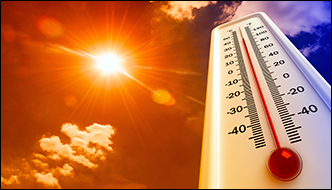
To avoid the potential health risks associated with extreme heat events, it's important to take proactive measures to stay safe and cool. Here are some tips to help you avoid the impacts of extreme heat:
- Stay informed: Keep track of weather forecasts and pay attention to heat advisories or warnings issued by local authorities. This will help you stay informed about expected high temperatures and plan accordingly.
- Stay hydrated: Drink plenty of water throughout the day, even if you don't feel thirsty. Avoid excessive amounts of caffeine or alcohol, as they can contribute to dehydration. Carry a water bottle with you and ensure access to clean drinking water.
- Dress appropriately: Wear loose-fitting, lightweight, and light-colored clothing made of breathable fabrics. Opt for a wide-brimmed hat and sunglasses to protect your face and eyes from the sun.
- Seek shade or air-conditioned spaces: When outdoors, try to spend time in shaded areas. If possible, limit outdoor activities during the hottest parts of the day, typically between 10 a.m. and 4 p.m. Seek shelter in air-conditioned places such as malls, libraries, community centers, or public buildings.
- Use sunscreen: Apply sunscreen with a high SPF (Sun Protection Factor) to exposed skin, even on cloudy days. Reapply it as directed on the product label, especially if you're sweating or spending time in water.
- Use cooling techniques: Take cool showers or baths to lower your body temperature. Use damp towels or take advantage of fans or air conditioners to create a cool indoor environment. Consider using a spray bottle with cool water to mist your face and body.
- Avoid strenuous activities: Minimize or avoid engaging in vigorous physical activities during extreme heat. If you need to exercise or work outdoors, try to schedule it during cooler hours, such as early morning or evening.
- Check on vulnerable individuals: Keep an eye on infants, young children, older adults, and individuals with chronic illnesses or mobility issues. They are more susceptible to heat-related illnesses and may require extra support or assistance.
- Never leave children or pets in vehicles: The interior of a parked vehicle can quickly reach dangerous temperatures, even with the windows cracked. Never leave children or pets unattended in a parked car, even for a short period.
- Be a good neighbor: Check on elderly or vulnerable neighbors to ensure they are coping with the heat and offer assistance if needed. Encourage community support and share heat safety information with others.
Remember, extreme heat can be life-threatening, so it's essential to take precautions to protect yourself and those around you. If you or someone else experiences symptoms of heat-related illness, such as dizziness, nausea, headache, rapid heartbeat, or confusion, seek medical attention immediately.
